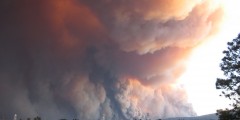Dimmer switches and circuit breakers
September 25, 2020
Since the beginning of this pandemic I have been writing blog posts charting the metaphors used to think and talk about it. Most of these metaphors are based on well-known experiences of floods, storms, wars and journeys – or air, water, earth and fire. However, I have recently noticed some other metaphors which are a …
Metaphors and realities: Coronavirus and climate change
September 18, 2020
We have been surrounded by global disasters this year, inflicted on us by ‘invisible enemies’. These invisible enemies have been made visible in two ways. In the case of the pandemic, disaster metaphors related to floods, fire and storms have made the coronavirus visible. In case of climate change, real floods, fires, storms and droughts …
Gene drives and societal narratives
August 21, 2020
Some days ago, I came across an interesting virtual conference (HT @Sarah_A_Hartley) about gene editing which includes a session on ‘societal narratives’. I have written quite a bit about societal narratives of gene editing, but more recently I became involved in the issue of ‘gene drive’, that is, “a system of biased inheritance in which …
The meaning of lockdown
August 7, 2020
The other day, my father in Germany, who is quite old, phoned me and asked what lockdown meant.* ‘Lockdown’ is now used in Germany instead of more native words like ‘Ausgangssperre’ (exit barrier, if you like). He especially wondered about the ‘down’ bit, as he understood the ‘lock’ bit and also had heard about ‘locking …
‘A fire raging’: Why fire metaphors work well for Covid-19
July 31, 2020
This is a post by Elena Semino, University of Lancaster. It was first published on the website of the ESRC Centre for Corpus Approaches to Social Science (CASS) on 1 July, 2020. It provides a thorough and fascinating analysis of fire metaphors used during the pandemic. *** Since the beginning of the Covid-19 pandemic, metaphors have been …
Pandemic blogging: Taking stock
July 24, 2020
Over the last few months I have written a number of blog posts about the social and cultural impacts of the current pandemic of COVID-19 caused by SARS-CoV-2. In this post I want to provide a brief overview of the various topics I have covered, from metaphors to politics. Pandemic metaphors As early as January …
Gene writing: Between art and nature
July 17, 2020
In the past, I have written a bit about genomics, synthetic biology and gene editing, from the perspective of language and culture. So, when Matthew Cobb alerted me to a new thing called ‘gene writing’ at the beginning of July, I pricked up my ears. I told myself that I should write a blog post …
Bubbles: A short history
July 6, 2020
Last week we heard a lot about bubbles, especially school bubbles and travel bubbles. This metaphor has been bubbling up for a while during the pandemic and I became curious about how and where it emerged. Then I saw a tweet from Gareth Enticott which contained an article about New Zealand researchers who had come …
CfP: Covid-19 and metaphors special issue
June 3, 2020
Call for contributions to Special Issue of Metaphor and Symbol on: Framing Covid-19: Assessing the Socio-cultural Imagery of the 2020 Corona Pandemic Guest-editors: Martin Döring (University of Hamburg, Germany) Brigitte Nerlich (University of Nottingham, United Kingdom) Context: The global Covid-19 pandemic has led to an explosion of metaphors and symbols. Research tracing and examining this …
Pandemic landscapes: Peaks and tunnels, waves and plateaus
May 6, 2020
Since the beginning of the Covid-19 pandemic I have collected metaphors used to talk about it. First there were metaphors for the virus and for what to do about the spread of the virus and so on. Then there were metaphors of lockdowns, confinement and imprisonment but also more hopeful ones of journeys. Now metaphors …
Subscribe by email
About this blog
This blog promotes discussion of topics related to the research programme 'Making Science Public: Challenges and Opportunities'. Our purpose is not to 'make science public'. Instead, we want to study the opportunities that have emerged for science to be more openly practiced and debated, but also the challenges posed by making science public or by promoting the making public of science as a solution to a variety of problems in society and in politics.
This blog will report on these and other issues related to the Leverhulme funded research programme: Making Science Public: Challenges and Opportunities
Useful links
Recent Posts
- Climate change and climate discourse: A dual disintegration
- Erving Goffman: Memories, method and metaphors
- Participation at the core: AI, ELSI and community engagement
- Understanding computational hermeneutics: Making meaning between the past and the present
- AI winter and AI bubble: Historical and metaphorical reflections
 MSP bookmarks
MSP bookmarks
- Twitter May 8, 2017
- Social innovations in Europe #RRI November 3, 2015
- Harvey Graff, the undisciplinarian September 20, 2015
- Replacing Pesticides With Genetics August 31, 2015
- Addressing hazardous chemicals in the circular economy August 25, 2015
Categories
- antibiotics
- anticipatory governance
- artifical intelligence
- big data
- biotechnology
- citizen science
- Climate Change
- Climate Politics
- co-production
- coronavirus
- Creationism
- Definition of Science
- designer babies
- disease
- disease
- engineering
- epigenetics
- Food Security
- Food sovereignty
- gene drive
- genomics
- GM Food
- GMOs
- history of science
- Hype
- images and visualisations
- imaginaries
- Immigration
- Impact
- infectious diseases
- innovation
- interdisciplinarity
- Knowledge Society
- Language
- Markets
- Metaphors
- microbiome
- neoliberalism
- Neuroscience
- open access
- Personal Reflection
- Politics
- Public education
- public engagement with science
- public needs
- public participation
- public policy
- public service
- publics
- regulatory science
- Religion
- Republican Party
- research impact
- responsible innovation
- responsive research
- Richard Dawkins
- risk
- Scepticism
- Science
- Science and Government
- science and politics
- Science and Songs
- science communication
- Science Communication
- Science Fiction
- Science Policy
- Social science
- sociology
- space
- space exploration
- synthetic biology
- transparency
- Trust
- Uncategorized
- Uncertainty
- visualisation
- wonder










